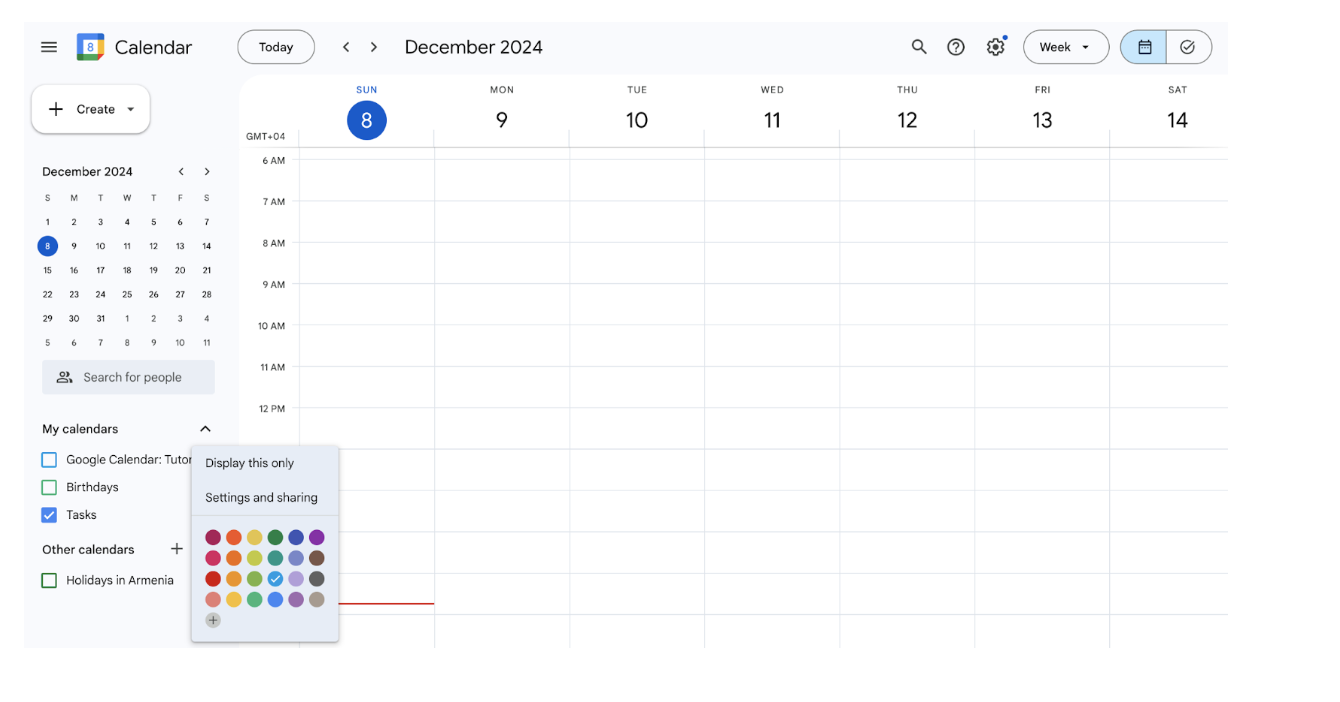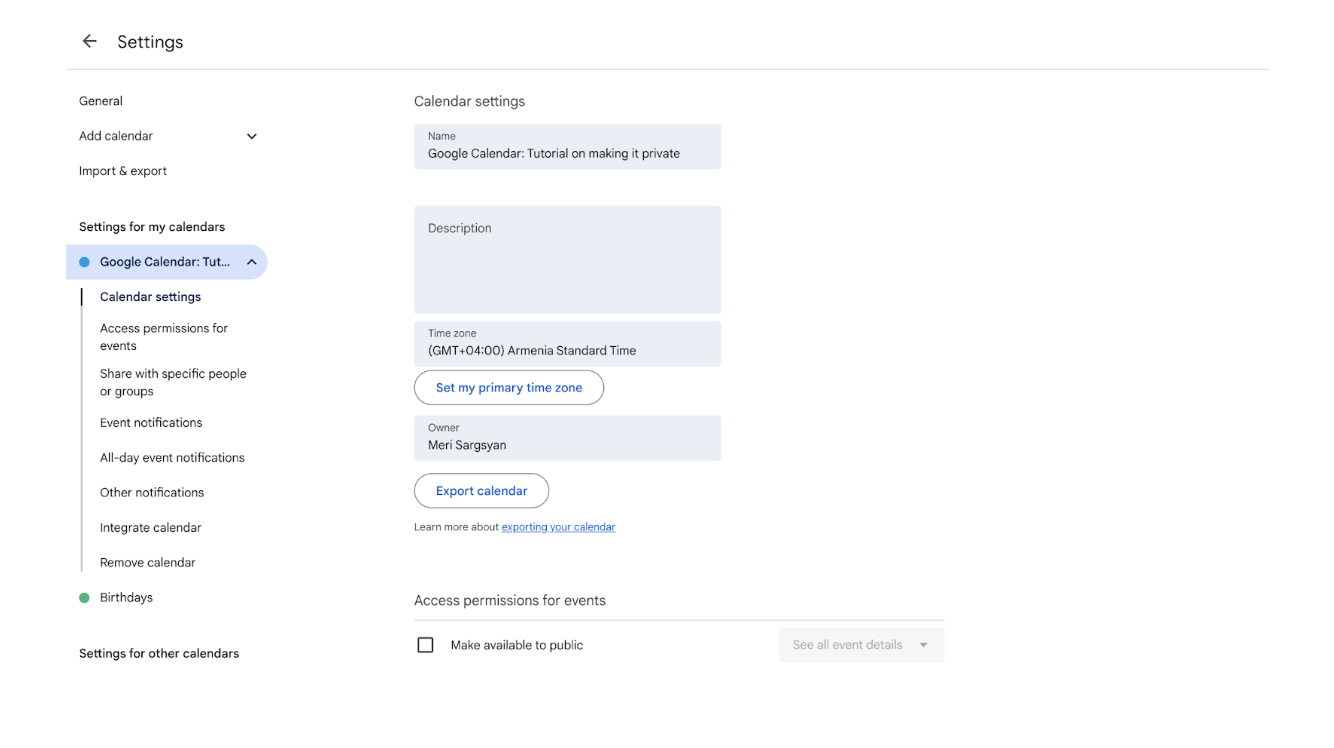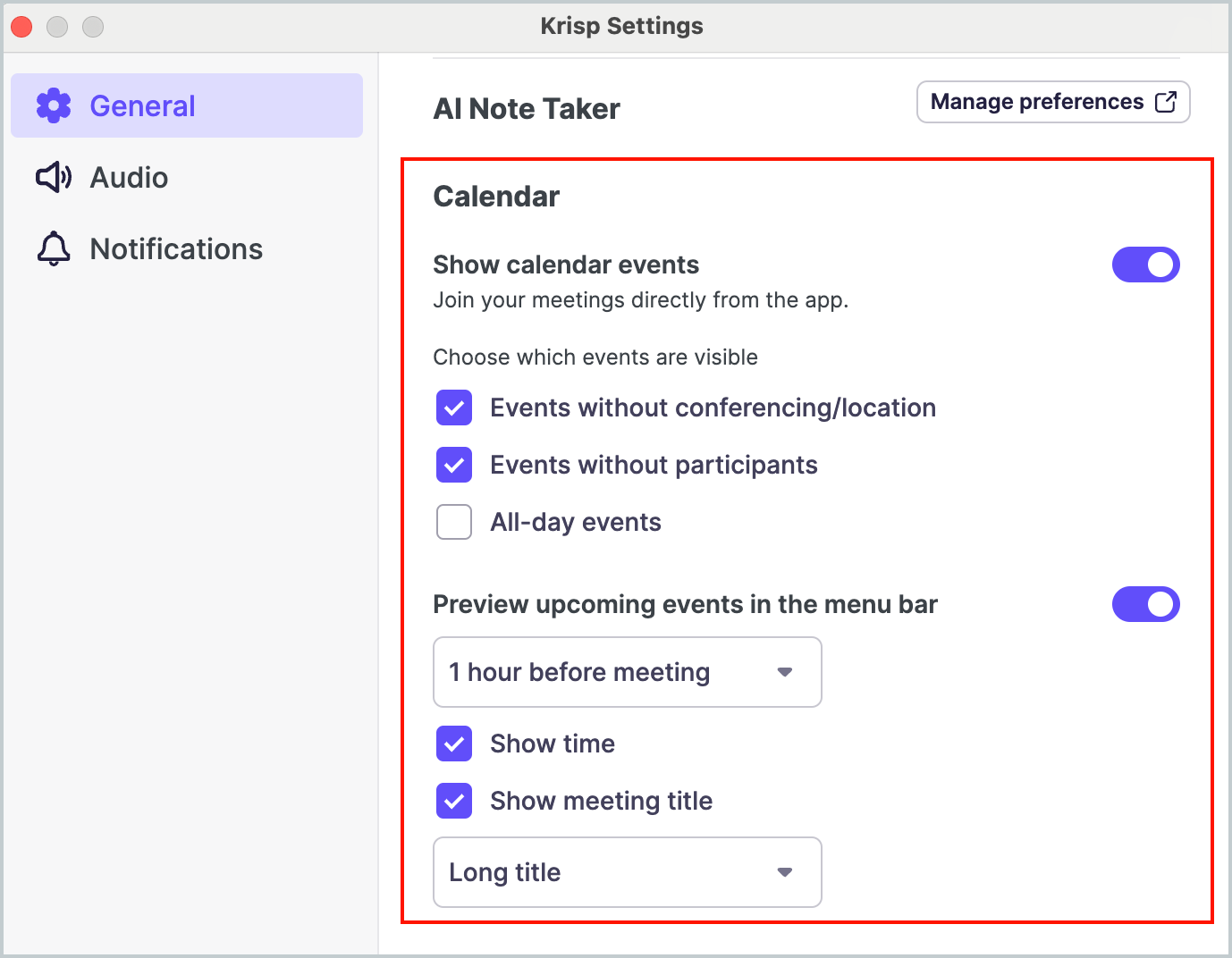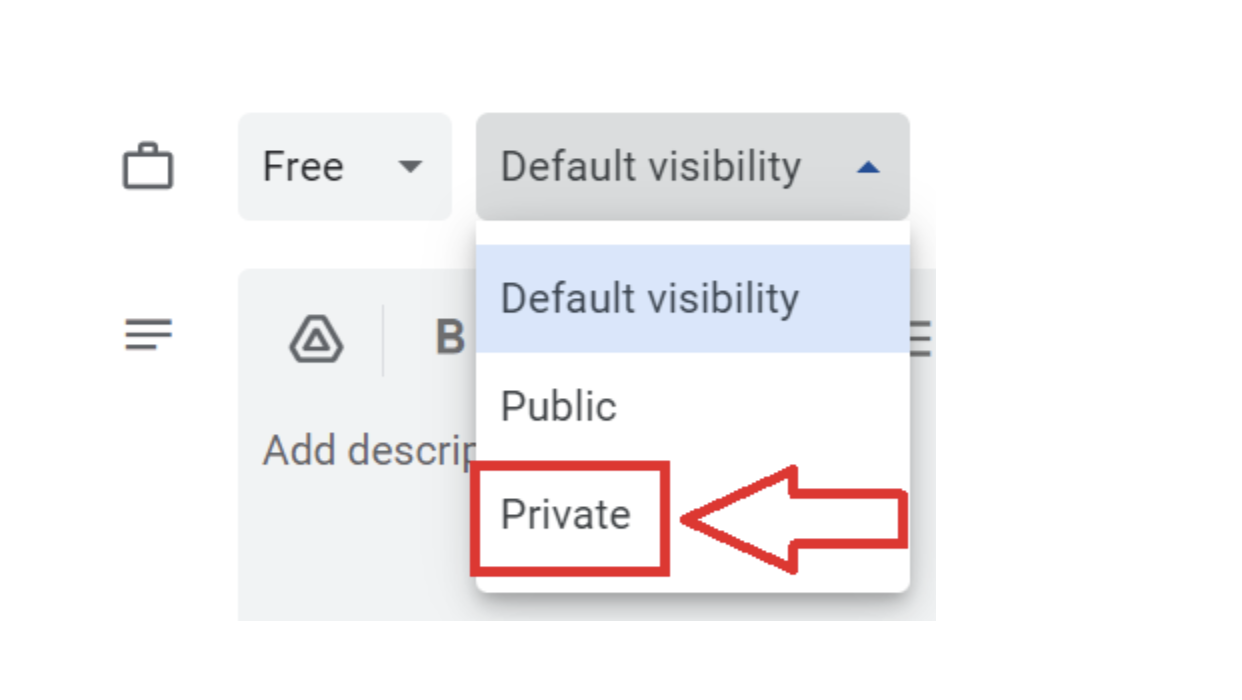Google Calendar is a go-to tool for managing personal and professional schedules, keeping everything from daily tasks to critical business meetings organized in one place. Its user-friendly interface and accessibility make it indispensable for individuals and teams alike. However, despite its convenience, many users overlook its privacy settings, leaving their sensitive information—such as meeting times, locations, and descriptions—vulnerable to unintended exposure.
Knowing how to make your Google Calendar private is essential to prevent potential breaches of confidentiality, which can impact both personal and professional security.
In this article, we’ll explore why safeguarding your Google Calendar is crucial, provide step-by-step guidance on adjusting your privacy settings, and demonstrate how to integrate tools like Krisp to enhance the security and professionalism of your virtual meetings. With these actionable tips, you can confidently manage your schedule while keeping your information secure and private.
Why Privacy Matters for Your Google Calendar
Privacy is a cornerstone of digital security, extending to your Google Calendar. A calendar may seem innocuous, but it often contains sensitive details that, if exposed, could lead to unintended consequences.
For instance, imagine a marketing manager scheduling a “Q4 Product Launch Strategy” meeting with detailed notes about the campaign. If their calendar settings are accidentally left public, competitors could access this information, gaining insight into proprietary strategies and timelines. This exposure could compromise the company’s competitive edge and result in financial losses.
By ensuring your calendar is private, you safeguard sensitive business information and personal details that could otherwise leave you vulnerable. Reviewing and adjusting your calendar’s privacy settings is a small step that can make a significant difference in securing your information.
Understanding Google Calendar Sharing Settings
Google Calendar provides flexible sharing options, allowing you to tailor access to meet your needs. However, this flexibility can sometimes lead to unintended exposure of sensitive details if not managed carefully. Understanding the key sharing settings is crucial for maintaining control and privacy:
- Public Access:
This setting allows anyone with the link to view your calendar. While it’s useful for public-facing roles or events, such as workshops, webinars, or community schedules, it’s highly risky for personal or confidential information. Public access means that anyone, including people you don’t know, could potentially see your event titles, times, and details. - Specific People:
You can share your calendar with select individuals, such as colleagues, family members, or project team members. This option lets you control their level of access, ranging from “view-only” to full editing permissions. For example, you might grant a team assistant the ability to add or modify events while allowing other colleagues to see only your availability. - Private Events:
Even on a shared calendar, you can mark specific events as “private.” This ensures that only the event organizer can see the details, while others see it as simply “busy.” For instance, if you’re sharing your calendar with your team, a private setting for personal appointments like a doctor’s visit ensures the details remain confidential.
By familiarizing yourself with these options, you can better control who sees your schedule and what level of detail they can access, minimizing the risk of unintended exposure. Taking the time to set these preferences can save you from future complications and ensure your calendar aligns with your privacy needs.
How to Make Your Google Calendar Private
Keeping your Google Calendar private is essential to protect your personal and professional schedule from unwanted access. Whether you want to keep your events confidential or ensure you’re only sharing with trusted people, these steps will guide you on how to adjust your privacy settings effectively.
Accessing Google Calendar Settings
- Open Google Calendar on your computer.
- In the left-hand “My calendars” section, click the down arrow to expand the list if needed.
- Hover over the calendar you want to adjust and click More (three vertical dots) next to the calendar name.
- Select “Settings and sharing” from the dropdown menu to access the settings for that calendar.

Changing Calendar Privacy Settings
To ensure your entire calendar is private:
- Under “Access permissions for events”, uncheck “Make available to public”. This will stop anyone from viewing your calendar.
- If you are sharing your calendar with your organization, turn off “Make available for [company name]” to stop organizational access.
- If you have shared your calendar with specific people or groups, go to “Share with specific people or groups” and click Remove next to their name to revoke access.

How to Adjust Event Privacy Settings
You can also make individual events private:
- Open the event you want to modify.
- In the event details, find ‘Default visibility’ and change it to ‘Private’.
- Click ‘Save’ to confirm the changes. This ensures that specific events, even on shared calendars, remain hidden.
How to Make Event Privacy Changes on the Google Calendar App
- Open the Google Calendar app.
- Tap on an event to view its details.
- In the upper-right corner, tap the pen icon to edit the event.
- Scroll down and tap Default Visibility, then select Private.
- Tap Save in the upper-right corner to confirm the change.
This ensures that the event is marked as private, keeping its details hidden from others who may have access to your calendar.
How to Share Your Calendar with Specific People
If you want to share your calendar with only trusted individuals:
- In the ‘Share with specific people or groups’ section, enter the email addresses of people you want to share your calendar with.
- Choose their permission level—‘See only free/busy (hide details),’ ‘See all event details,’ or ‘Make changes and manage sharing.’
- Click ‘Send’ to share your calendar.
Additional Tips for Securing Your Calendar
- Enable Two-Factor Authentication (2FA)
Protect your Google account with 2FA to prevent unauthorized access.- Go to your Google Account security settings.
- Enable 2FA and link it to a trusted device.
- Review Permissions Regularly
Periodically check who has access to your calendar and remove unauthorized users. - Use Minimal Descriptions
Avoid overly detailed event titles or notes, especially for sensitive meetings. Use generic terms like “Appointment” instead.
How Can I Hide My Google Calendar Details from Others?
To keep your Google Calendar details private while still sharing your availability, use the “See only free/busy” option:
- Open Google Calendar on your computer.
- In the “My calendars” section, hover over the calendar you want to adjust and click the three dots (⁝).
- From the dropdown menu, select Settings and sharing.
- In the Share with specific people section, enter the email addresses of those you wish to share your calendar with. Next to each person’s email, select See only free/busy (hide details) from the dropdown menu.
- Ensure the changes are saved so others can only view your availability without accessing event details.
Integrating Krisp for Enhanced Privacy in Virtual Meetings
What is Krisp?
Krisp is a desktop application that enhances online meetings by leveraging AI-powered features such as Noise Cancellation, Transcriptions, Meeting Notes, and Recording to boost productivity. Let’s take a closer look at how Krisp AI Meeting Assistant features can have a significant impact on privacy, and why they are essential for anyone who values confidentiality and clear communication during online calls.

1. AI Noise Cancellation
One of Krisp’s core features is its AI-powered noise cancellation, which removes unwanted background noise such as traffic sounds, keyboard typing, dogs barking, or conversations from other rooms.
Impact on Privacy:
- Prevents Accidental Audio Leaks: By eliminating external noises, Krisp ensures that personal or confidential information shared during your meeting is not overheard by others, preventing unwanted exposure of sensitive topics. This feature is especially useful when discussing proprietary business strategies or private matters, ensuring your conversations are not compromised by external sounds.
- Maintains Professionalism: In a professional setting, distracting noises can cause misunderstandings or interrupt the flow of a conversation. Krisp keeps your meetings clear and professional, fostering an environment where confidentiality is maintained, and focus remains on the task at hand.
2. Meeting Transcription
Krisp offers real-time transcription for online meetings and calls. It automatically transcribes everything said during the meeting, providing an accurate text record of the discussion. This transcription can be accessed by both the meeting participants and anyone who has been given permission to view it.
Impact on Privacy:
- Sensitive Data in Written Form: Having a transcription of your meetings means you can revisit details of sensitive discussions. Krisp helps to ensure these transcriptions are securely stored and managed, minimizing the risk of accidental exposure. Only authorized individuals should be able to access this data, keeping your private information safe.
- No Need for Notes: As Krisp automatically transcribes your meeting, you can focus entirely on the conversation, knowing that no private points will be lost. This also ensures that there is an accurate record of what was discussed without relying on manual note-taking, which could be prone to human error or incomplete documentation.
3. AI Meeting Notes and Summary
Krisp AI Note Taker also goes beyond transcription with its AI meeting notes and summary feature. After your meeting concludes, Krisp automatically generates a meeting summary, key action items, and highlights of what was discussed.
Impact on Privacy:
- Focus on Privacy-Approved Content: By automatically summarizing meetings, Krisp helps to ensure that important details are captured in a succinct and private manner. You don’t have to worry about notes being taken incorrectly or exposing confidential information inappropriately, as the AI ensures only the key takeaways are shared in a professional format.
- Secured Summaries and Action Items: These meeting summaries are generated in real time, ensuring privacy while also helping teams stay organized. Since sensitive details are summarized and not transcribed verbatim, the risk of accidental information leakage is minimized. You can be confident that only the necessary information is circulated, and with encryption in place, the meeting summary stays secure.
4. Meeting Recording
Regardless of which communication platform you’re using, Krisp can automatically record your meetings in Zoom, Google Meet, Microsoft Teams, or other apps.
Impact on Privacy:
- Confidential Recordings: Krisp ensures that your meeting recordings are secure and free from distractions, so sensitive conversations are clearly captured without the risk of irrelevant noise being recorded. If you’re discussing confidential business strategies or sensitive customer data, Krisp helps maintain the integrity of the recording.
- Access Control: Krisp allows you to manage who can access these recordings, ensuring only the intended audience can view or listen to the conversations. This level of control is essential for maintaining privacy, especially when dealing with proprietary or personal information. You can also choose to encrypt or restrict access to these recordings, further ensuring privacy.
Together, these features make Krisp a strong choice for teams that value confidentiality alongside productivity. A broader comparison of the best AI note-taking apps highlights how privacy-first approaches differ across modern meeting tools.
How to Integrate Krisp with Google Calendar
Integrating Krisp with your Google Calendar workflow is simple and ensures you’re always ready for a noise-free, private meeting.
- Download and Install Krisp:
Visit Krisp’s official website to download the app. Follow the installation instructions for your operating system (Windows or macOS). Krisp is easy to set up and takes only a few moments. - Set Krisp as Your Audio Input:
Once Krisp is installed, open your preferred virtual meeting platform (such as Zoom, Google Meet, or Microsoft Teams). Go to the audio settings and select “Krisp Microphone” as your input device. Krisp will now handle your microphone input and ensure that any background noise is automatically filtered out. - Schedule Meetings via Google Calendar:
Now, create a new event in Google Calendar as you normally would. Add the virtual meeting link (for instance, Zoom, Google Meet, or another platform). When it’s time for the meeting, simply launch the meeting through the link, and make sure Krisp is active in your audio settings. The result? A noise-free, private meeting where every word is clear and confidential.
Final thoughts
Making your Google Calendar private is a vital step in safeguarding both your personal and professional information. By customizing your calendar’s privacy settings, such as marking specific events as private and limiting access to only trusted individuals, you ensure that sensitive details remain confidential. Moreover, integrating additional tools like Krisp can elevate your privacy even further, enhancing the security of your virtual meetings through AI-powered noise cancellation, transcriptions, and meeting summaries.
With these simple yet effective steps, you can confidently manage your schedule and maintain privacy, ensuring that your information stays protected from unwanted exposure. By prioritizing privacy, you not only protect your calendar but also build a foundation of trust and professionalism in your daily interactions.
FAQ



